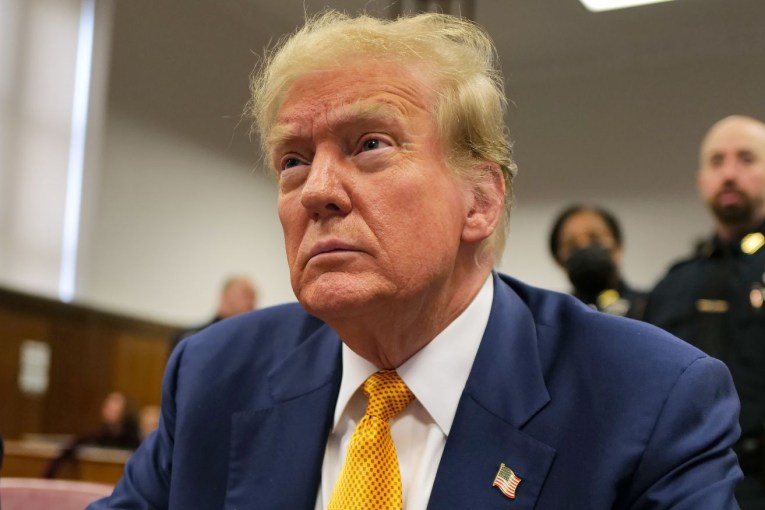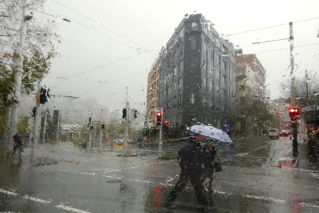Google’s Australian CEO Mel Silva wasn’t bluffing last week when she said it would “stop making Google search available in Australia” if the government went ahead and legislated the News Media Bargaining Code.
Australia would definitely become a Google-free zone, and Australians would be stumbling about the internet wilderness with nothing but Bing and DuckDuckGo to guide them.
Actually there’s nothing much wrong with them, and maybe that’s what we’ll end up with.
Google originally acquired its monopoly by being better than the rest – Sergey Brin and Larry Page built a fantastic search engine – but the others have pretty much caught up now, and these days Google’s monopoly (95 per cent of all internet search) is mostly brand legacy and the self-reinforcing power of monopoly rents.

Google Australia managing director, Mel Silva appears via video link before a Senate inquiry on Friday. Photo: AAP
The government’s problem is that Microsoft (owner of Bing) and DuckDuckGo might not sign up to the code in its present form either.
That’s certainly what Google says, but no one really knows.
Google says the entire business model of internet search would be broken if it was forced to pay firms for the privilege of driving traffic to its websites, whether they were news media or travel agents.
What nobody knows is whether a new disruptor would be prepared to offer a search service while passing on most of the ad revenue they get to the businesses they link to.
Could search become a low-margin, ticket-clipping business instead of the high-margin bonanza it is now – for Google if no one else.
Its margins are huge because firms pay them for links and to advertise on their pages, and Google gets to keep it all. Would someone else be prepared to do it for a 10 per cent clip, or even 50 per cent?
To understand what’s going on we need to take a step back.
The ACCC wrote a draft News Media Bargaining Code last year that proposed enforced negotiations between the platforms – Google and Facebook – and news publishers to generate payments for news snippets appearing in Google search results and Facebook’s timeline, backed by mandatory arbitration if they can’t agree.
The aim was to save journalism from complete destruction and the Coalition government, to the surprise of some (me), said it would legislate it.
Two fiendish provisions were put in by the ACCC: First the arbitration would have to be “final offer” – that is, the arbitrator couldn’t simply listen to both sides and come up a compromise in the middle, but would be forced to accept one of the two offers.
The purpose of that is to prevent ambit claims, like those that unions and employers do in the Fair Work Commission.
Second, Google and Facebook would have to treat all publishers the same – they couldn’t pick them off, do a deal with one and cut out any recalcitrant publishers. There could be no discrimination.

Josh Frydenberg has echoed Scott Morrison’s comments about Australia making the rules. Photo: AAP
Google told the ACCC and Treasurer Josh Frydenberg last July that if the code went ahead in that form they’d have to cut off Australia, and last week that went public when Ms Silva told a Senate committee the same thing.
Facebook said months ago that it would cut all news out of its Australian feeds.
After Ms Silva’s statement to the Senate committee, Prime Minister Scott Morrison said: “Let me be clear. Australia makes our rules for things you can do in Australia … we don’t respond to threats”.
Yes, Prime Minister, but what if they’re not bluffing? (They’re not).
And what if Mel Silva’s right that no one else would be able to offer internet search on those terms?
Australians would not be pleased if they could no longer search the internet. It hardly bears thinking about.
Ms Silva spent some of her opening statement on Friday talking about Google’s “News Showcase”, an initiative launched last year to mollify the publishers.
It’s currently operating in Brazil and Germany and is basically what it sounds like – something separate to search results that “showcases” news, and for which publishers get paid, although it’s not clear whether anyone is going to actually use it instead of just searching, as they do now.
Google’s global budget for News Showcase is $US1 billion ($1.3 billion) over three years, or $US333 million ($433 million) a year. Some 450 publishers have apparently signed up to it, including seven in Australia. It’s better than nothing.
Google’s most recent annual revenue, for 2019, was $US160 billion, so that News Showcase budget amounts to 0.2 per cent of revenue.
Google’s Australian revenue was $4.6 billion; 0.2 per cent of that is $9.2 million; divided among, say, 30 publishers, that’s about $300,000 each, or three journalists. Better than nothing.

The government believes it is negotiating with Facebook and Google over money. Photo: Getty
Anyway the government thinks it’s negotiating with Google and Facebook over money, trying to get that number up with everyone saving face. Standard practice.
The trouble is that Google and Facebook are trying to protect their margins from what they see as an attack on their business models that would spread around the world – that is, an attempt to make them pay companies for the service that they provide them – web traffic.
The obvious compromise would be for arbitration to be attached to the News Showcase thing, not search.
Google would accept that, I think, but it might be too much of a climb down for the government and the ACCC.
The way out of the hole for them would be if Microsoft and/or DuckDuckGo rang up and said they were prepared to provide internet search to Australians for only a small profit, giving most of the ad revenue back to the businesses being searched and linked to.
Australia would thus become the beachhead for a global revolution, where internet search becomes the low-margin regulated utility business it should be.
Maybe Microsoft and DuckDuckGo would do it.
It would certainly be tempting for them to replace Google in a market like Australia, and in any case they’re not making any money at all now, so even a little bit would be an improvement. So watch this space.
As for Facebook, publishers decide to put their stories on it. They don’t have to.
Alan Kohler writes for The New Daily twice a week. He is editor in chief of Eureka Report and finance presenter on ABC News









